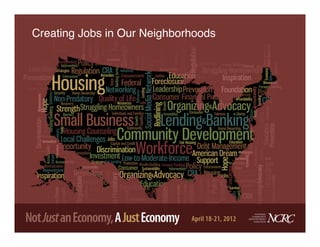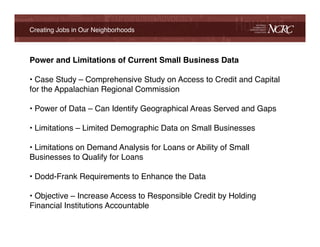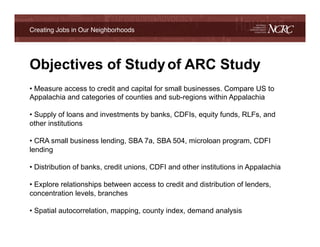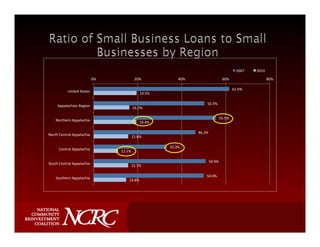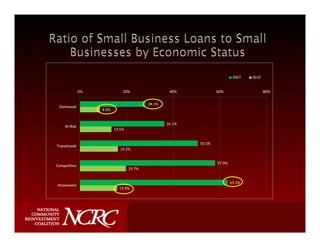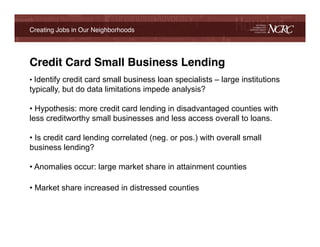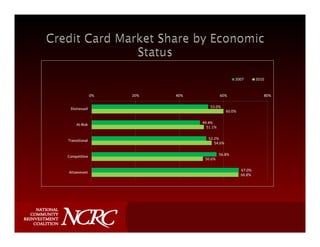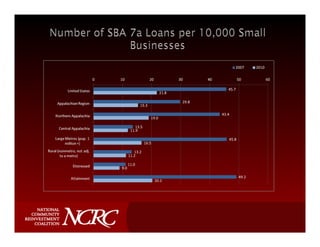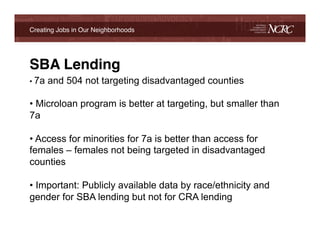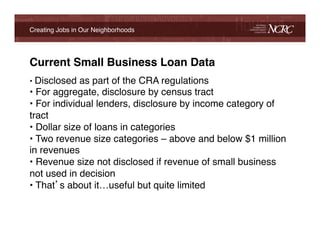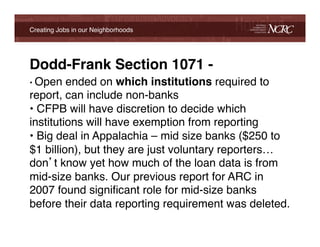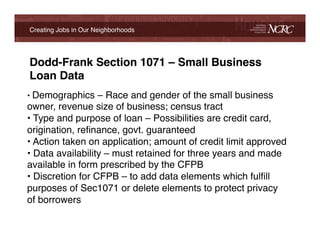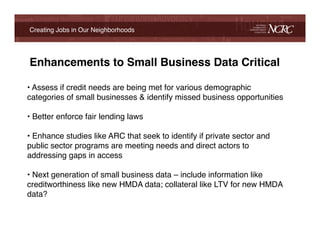Josh Silver | Creating Jobs Workshop 2
- 1. Creating Jobs in Our Neighborhoods!
- 2. Creating Jobs in Our Neighborhoods! Josh Silver, Vice President of Research and Policy, NCRC April 20, 2012
- 3. Creating Jobs in Our Neighborhoods! Power and Limitations of Current Small Business Data! ŌĆóŌĆ» Case Study ŌĆō Comprehensive Study on Access to Credit and Capital for the Appalachian Regional Commission! ! ŌĆóŌĆ» Power of Data ŌĆō Can Identify Geographical Areas Served and Gaps! ! ŌĆóŌĆ» Limitations ŌĆō Limited Demographic Data on Small Businesses! ! ŌĆóŌĆ» Limitations on Demand Analysis for Loans or Ability of Small Businesses to Qualify for Loans! ! ŌĆóŌĆ» Dodd-Frank Requirements to Enhance the Data! ! ŌĆóŌĆ» Objective ŌĆō Increase Access to Responsible Credit by Holding Financial Institutions Accountable! !
- 4. Creating Jobs in Our Neighborhoods! Objectives of Study of ARC Study ! ŌĆóŌĆ» Measure access to credit and capital for small businesses. Compare US to Appalachia and categories of counties and sub-regions within Appalachia ŌĆóŌĆ» Supply of loans and investments by banks, CDFIs, equity funds, RLFs, and other institutions ŌĆóŌĆ» CRA small business lending, SBA 7a, SBA 504, microloan program, CDFI lending ŌĆóŌĆ» Distribution of banks, credit unions, CDFI and other institutions in Appalachia ŌĆóŌĆ» Explore relationships between access to credit and distribution of lenders, concentration levels, branches ŌĆóŌĆ» Spatial autocorrelation, mapping, county index, demand analysis !
- 5. 2007 ┬Ā 2010 ┬Ā 0% ┬Ā 20% ┬Ā 40% ┬Ā 60% ┬Ā 80% ┬Ā 61.6% ┬Ā United ┬ĀStates ┬Ā 19.5% ┬Ā 50.3% ┬Ā Appalachian ┬ĀRegion ┬Ā 16.2% ┬Ā 55.5% ┬Ā Northern ┬ĀAppalachia ┬Ā 19.4% ┬Ā 46.2% ┬Ā North ┬ĀCentral ┬ĀAppalachia ┬Ā 15.8% ┬Ā 33.3% ┬Ā Central ┬ĀAppalachia ┬Ā 11.1% ┬Ā 50.9% ┬Ā South ┬ĀCentral ┬ĀAppalachia ┬Ā 15.7% ┬Ā 50.0% ┬Ā Southern ┬ĀAppalachia ┬Ā 14.8% ┬Ā
- 7. Creating Jobs in Our Neighborhoods! Credit Card Small Business Lending! ŌĆóŌĆ» Identify credit card small business loan specialists ŌĆō large institutions typically, but do data limitations impede analysis? ŌĆóŌĆ» Hypothesis: more credit card lending in disadvantaged counties with less creditworthy small businesses and less access overall to loans. ŌĆóŌĆ» Is credit card lending correlated (neg. or pos.) with overall small business lending? ŌĆóŌĆ» Anomalies occur: large market share in attainment counties ŌĆóŌĆ» Market share increased in distressed counties ! !
- 10. Creating Jobs in Our Neighborhoods! SBA Lending! ŌĆóŌĆ» 7a and 504 not targeting disadvantaged counties ŌĆóŌĆ» Microloan program is better at targeting, but smaller than 7a ŌĆóŌĆ» Access for minorities for 7a is better than access for females ŌĆō females not being targeted in disadvantaged counties ŌĆóŌĆ» Important: Publicly available data by race/ethnicity and gender for SBA lending but not for CRA lending ! !
- 11. Creating Jobs in Our Neighborhoods! Current Small Business Loan Data! ŌĆóŌĆ» Disclosed as part of the CRA regulations! ŌĆóŌĆ» For aggregate, disclosure by census tract! ŌĆóŌĆ» For individual lenders, disclosure by income category of tract! ŌĆóŌĆ» Dollar size of loans in categories! ŌĆóŌĆ» Two revenue size categories ŌĆō above and below $1 million in revenues! ŌĆóŌĆ» Revenue size not disclosed if revenue of small business not used in decision! ŌĆóŌĆ» That s about itŌĆ”useful but quite limited! !
- 12. Creating Jobs in Our Neighborhoods! Section 1071 ŌĆō Small Business Loan Collection ŌĆō Dodd Frank! The purpose of this section is to facilitate enforcement of fair lending laws and enable communities, governmental entities, and creditors to identify business and community development needs and opportunities of women-owned, minority-owned, and small businesses.! !
- 13. Creating Jobs in our Neighborhoods! Dodd-Frank Section 1071 - ! ŌĆóŌĆ» Open ended on which institutions required to report, can include non-banks! ŌĆóŌĆ» CFPB will have discretion to decide which institutions will have exemption from reporting! ŌĆóŌĆ» Big deal in Appalachia ŌĆō mid size banks ($250 to $1 billion), but they are just voluntary reportersŌĆ” don t know yet how much of the loan data is from mid-size banks. Our previous report for ARC in 2007 found signi’¼ücant role for mid-size banks before their data reporting requirement was deleted.! !
- 14. Creating Jobs in Our Neighborhoods! Dodd-Frank Section 1071 ŌĆō Small Business Loan Data! ŌĆóŌĆ» Demographics ŌĆō Race and gender of the small business owner, revenue size of business; census tract! ŌĆóŌĆ» Type and purpose of loan ŌĆō Possibilities are credit card, origination, re’¼ünance, govt. guaranteed! ŌĆóŌĆ» Action taken on application; amount of credit limit approved! ŌĆóŌĆ» Data availability ŌĆō must retained for three years and made available in form prescribed by the CFPB! ŌĆóŌĆ» Discretion for CFPB ŌĆō to add data elements which ful’¼üll purposes of Sec1071 or delete elements to protect privacy of borrowers! ! !
- 15. Creating Jobs in Our Neighborhoods! Enhancements to Small Business Data Critical! ŌĆóŌĆ» Assess if credit needs are being met for various demographic categories of small businesses & identify missed business opportunities! ŌĆóŌĆ» Better enforce fair lending laws! ŌĆóŌĆ» Enhance studies like ARC that seek to identify if private sector and public sector programs are meeting needs and direct actors to addressing gaps in access! ! ŌĆóŌĆ» Next generation of small business data ŌĆō include information like creditworthiness like new HMDA data; collateral like LTV for new HMDA data?! !
- 16. THANK YOU!! To follow up with the speaker:! Josh Silver, Vice President of Research and Policy, NCRC! 202-464-2708 or jsilver@ncrc.org! Presentations will be available at www.ncrc.org/conference by ! April 30, 2012!

